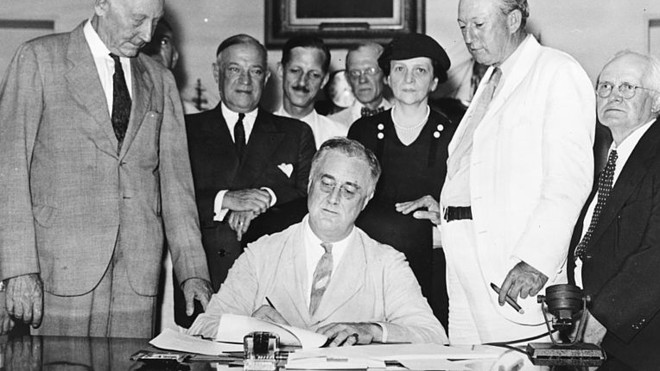The social-distancing measures required to combat the COVID-19 pandemic are causing the economy to contract and shed jobs at unprecedented rates. These extreme and necessary measures will save lives, and policy makers will have a short runway to reboot the economy once it is safe.
In the interim, the Federal Reserve and the Treasury Department are taking dramatic steps through newly created special-purpose vehicles. Trillions of dollars will flow through the vehicles to ensure liquidity for banks and hedge funds, backstop corporate balance sheets, and purchase debt to save commercial loan markets.
These actions are not without precedent. President Franklin D. Roosevelt’s New Deal inspires them.
With the New Deal, Roosevelt rewrote the rules of the economy to manufacture a middle class because he knew half-measures could spell the end of democracy. So he tapped the Reconstruction Finance Corp., or RFC — a special-purpose public bank — to bail out private banks. But he took one additional step. Roosevelt used the RFC to finance massive public-works and social programs, which transformed America. The latter is what is missing in our current economic response.
Today, we must follow Roosevelt’s example and launch a network of national, state and local public banks to forge a 21st-century New Deal.
Seventy-plus years ago, the RFC acted as investor, de-risking entity, collaborator with private capital and market activist. The bank did whatever was needed to keep the economy moving for working Americans. It had an incredibly broad scope: issuing mortgages, financing railroads, bringing electrification to rural areas and capitalizing private banks. And public banks could do the same today.
Instrumental will be tackling poverty and inequality head-on. The pandemic puts our country’s underlying weaknesses into stark relief. Forty-four percent of the workforce is considered low-income. Just four in 10 Americans have enough savings to pay for a $400 unanticipated expense. Student loans and credit-card debt hobble young and old. Five of six families with incomes below the federal poverty level pay 30% of their income toward child care. And the average American family spends 37% of their income on housing.
A national public banking system connected to taxpayer-owned state and local banks can finance solutions to inequality and poverty, which constitute America’s underlying sickness.
There is no shortage of shovel-ready projects. Nationally, there are over $1 trillion in infrastructure-related deferred maintenance costs, and the deficit of affordable housing tops 7 million units. Public banks can invest in our nation’s care-giving infrastructure, paving the way for a new public option. Public banks can offer low-cost mortgages and spur rural broadband efforts — our generation’s Rural Electrification Administration. Public banks can provide startup financing to entrepreneurs of colors and worker cooperatives seeking to purchase small industrial firms from retiring baby boomers. Pension funds can partner with public banks to finance large-scale projects, turbocharge job creation and generate healthy returns for retirees.
“ The economic recovery from the coronavirus pandemic must build America’s financial immune system, ensuring we have the antibodies to respond effectively to the next disaster. ”
At a consumer level, public banks can offer no-cost checking and savings accounts and extend overdraft protection and short-term credit — thus eliminating the need for payday lenders and currency exchanges. Today, taxpayers send Wall Street hundreds of billions of dollars in fees and interest payments. With a network of public banks, taxpayers can pay themselves interest and eliminate pension-fund management fees, saving trillions over a 20- or 30-year period. For perspective, the fee savings alone can fund baby bonds or basic-income programs.
See:Andrew Yang says ‘wow’ as Pope Francis speaks highly of universal basic income
Most importantly, public banks can take on a reparative role by centering the communities excluded by the first New Deal. Such efforts would connect America in ways that would generate returns, reduce social isolation, build small businesses and reduce the scourge of undereducation.
These are not radical ideas; this is our history.
With the CARES Act, the Federal Reserve and the Department of Treasury made big banks and the investor class whole with trillions in liquidity and cheap money. At the same time, average Americans will receive a one-time check of just $1,200, the type of half-measure Roosevelt feared.
See:Will you get a $1,200 check from the $2 trillion stimulus bill?
President Roosevelt understood that returning America to pre-Depression realities was a threat to the economic system and to democracy. He forged a New Deal through public banking and financed the creation of a middle class. In doing so, he recalibrated the markets to orient at the intersection of public good and economic gain. To win the war against COVID-19, we must do the same.

President Franklin D. Roosevelt signs the Social Security Act in August 1935, joined by several congressional Democrats and his secretary of labor, Frances Perkins.
Library of Congress
Going back to pre–COVID-19 America is not an option. The economic recovery from this pandemic cannot mirror prior recovery efforts under which the people hurt the most were helped the least. The virus will alter America’s economic and social fabric, and a few months from now our country will be a different place.
The economic recovery must build America’s financial immune system, ensuring we have the antibodies to respond effectively to the next disaster. We cannot do this without addressing poverty and inequality in explicit, substantive ways. Now is the time to harness the full arsenal of democracy to forge a 21st-century New Deal that creates an economy that works for all of us.
Timothy Knowles is the managing director of the Academy Group and a senior fellow at the University of Chicago’s Harris School of Public Policy. Ameya Pawar is a Leadership in Government fellow with the Open Society Foundations working on national public banking efforts and with the Economic Security Project. He served two terms on Chicago’s City Council.
|










Add Comment